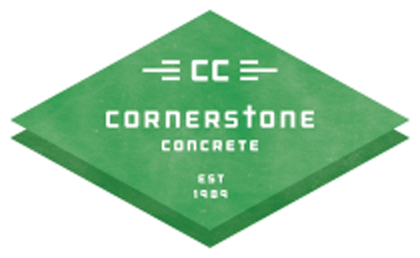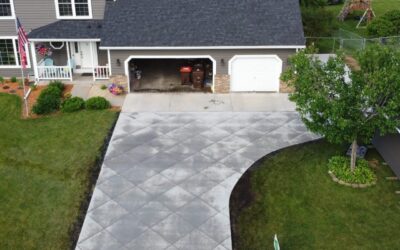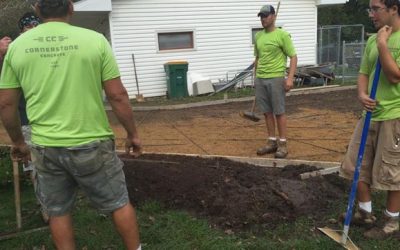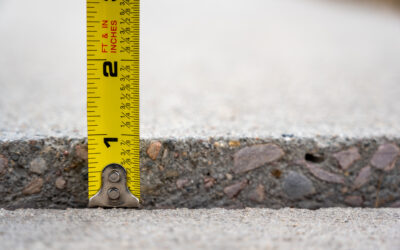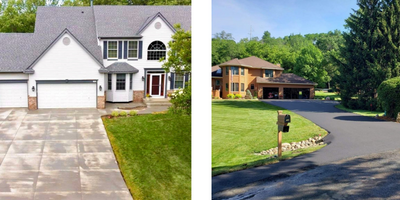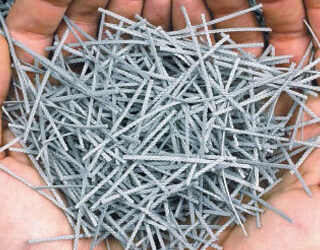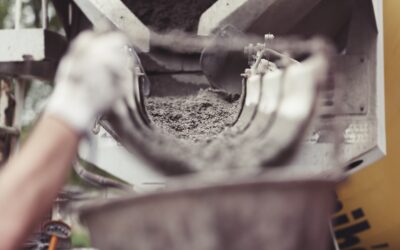Our Latest Posts
We are the concrete driveway experts and we put the customer first.
Our blogs are here to answer any and all questions you might have about concrete material, cement material, pros and cons, driveway maintenance, our proven installation process, and more! Read on to know you are making the right decision when it comes to your new driveway.
Accessories: A Guide To Concrete Driveway Coloring and Stamping
Blog Highlights: Cost-Effective and Durable: Stamped and colored concrete offers the luxurious look of high-end materials like brick or stone at a fraction of the cost while providing long-lasting durability. Versatile Customization: Homeowners can choose...
Benefits of Sealing Your Driveway in the Midwest
Blog Highlights: Protection and Longevity: Sealing concrete driveways in the Midwest guards against freeze-thaw cycles, water damage, and cracking, extending their lifespan. Aesthetic and Value: Sealed driveways look better, prevent weed growth, and...
Repairing a Concrete Driveway: How Do You Fix Cracked Concrete
Concrete driveways are known for their durability and strength, making them a popular choice for homeowners. However, even the sturdiest concrete can develop cracks over time due to various factors. Minnesota’s harsh winters and fluctuating temperatures can exacerbate...
Preparing Your Driveway for Spring: A Maintenance Guide
Initial Inspection and Cleaning: Conduct a thorough inspection for any damage from winter, and clean the driveway to ensure there is no damage to the concrete. Damage Repair and Replacement: Address minor damages with DIY solutions or seek professional help for...
The Effects of Deicing Chemicals on Concrete Driveways: What You Need to Know
Blog Highlights: Deicing chemicals: Absorb moisture, lowering water's freezing point. Concrete vulnerabilities: Freeze-thaw cycles cause cracks and structural damage. Preventative measures: Apply sealants and shovel snow promptly. Regional relevance:...
Pouring Concrete in Cold Weather: Can You?
Blog Highlights: Clean and Wash: Regularly clean your driveway to remove debris and stains, utilizing a power washer for thorough cleaning. Seal the Concrete: Apply a protective sealant to the driveway to guard against moisture and debris, extending its...
How to Winterize Your Concrete Driveway (and Why You Should)
Blog Highlights: Importance: Protect your driveway from the freeze-thaw cycle to prevent surface flaking and maintain your home's value. Assessment: Inspect for cracks and water damage before winter to address potential worsening. Cleaning: Keep the...
How Much Does a Concrete Driveway Increase Your Home’s Value?
Blog Highlights: Curb Appeal: A new concrete driveway elevates your home’s exterior. Financial ROI: Concrete driveways can increase property value by 5-10%. Convenience: A driveway offers dedicated parking, enhancing desirability. Durability: Concrete...
Which is Better…Rebar or Fiber Mesh Concrete?
When it comes to constructing a strong and durable...
Pouring Concrete in Hot Weather: A Guide
Blog Highlights: Slump loss, reduced setting time, plastic shrinkage, and thermal cracking are common in hot weather. Adjusting the mix, controlling temperature, timing the pour, protecting the surface, and proper curing all contribute to a resilient...
Frost Heaving: Your Concrete Driveway Will Rise in Winter
Blog Highlights: Ensure professional installation to mitigate frost heaving. Consider using Macro Synthetic Fibers for increased driveway resilience. Add insulation layers between your driveway and the ground for extra protection. Monitor your driveway for signs...
Prepping for Winter: Concrete Driveway Winter Care and Maintenance
Blog Highlights Clean and wash your driveway thoroughly before winter. Seal your concrete for additional protection. Ensure proper drainage and level ground to prevent slipping hazards. Avoid using salt; use Cherry Stone Grit instead. Remove snow frequently with...
Which is Better for a Driveway, Concrete or Asphalt?
Blog Highlights: Concrete driveways cost 45% more upfront than asphalt but vary by size and style. Concrete lasts 40-50 years and supports heavier vehicles; asphalt lasts 15-20 years. Concrete cures in 10 days; asphalt is usable immediately and dries in 2-3...
The New Concrete Driveway Reinforcement: Macro Synthetic Fibers
Blog Highlights: Macro synthetic fibers replace traditional steel rebar, providing better flexibility and crack resistance. These fibers offer non-corrosive and stain-resistant properties, reducing maintenance needs over time. The mixing of fibers...
What is the Difference Between Concrete and Cement?
Blog Highlights: Cement: An ingredient in concrete, cement acts as a binder with aggregates to form durable materials, suitable for grouting, masonry, and crafts. Concrete: Known for its strength, concrete is ideal for infrastructure like driveways and bridges,...
Ready to get your new concrete driveway installation or replacement started?
Request an estimate to learn more!
